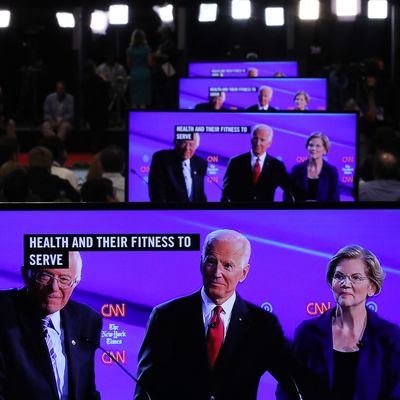
It’s been a sub-rosa issue throughout the earliest phases of the 2020 Democratic presidential nomination competition. But aside from a not-very-clear generational challenge by Eric Swalwell in the very first debate to Joe Biden to “pass the torch,” and a snide comment by Julián Castro in the September debate that suggested Biden had experienced a senior moment, the age issue hasn’t come up all that much.
It took a Bernie Sanders heart attack to make the age and health of candidates an issue that moderators would raise and that debate viewers would have to think about in an informed way. Citing the candidate’s current age (78), Erin Burnett asked Sanders how he would reassure voters he was up to the job. As the Los Angeles Times reported, that led to a frank exchange involving the septuagenarians in the race:
“Well, let me invite you all to a major rally we’re having in Queens, N.Y.,” Sanders said, before promising a special guest and touting his website. “We are going to be mounting a vigorous campaign all over this country that … I think can reassure the American people.”
Turns out Sanders was alluding to an endorsement he’s about to get from a progressive icon from the other end of the generational spectrum:
As someone who has openly worried for a long time that Sanders and Biden might be too old to serve as viable challengers to Donald Trump, I’d observe that Sanders was very effective in this debate — possibly more effective than the old pre-heart attack Sanders who tended to shout ever more loudly in events like this one. But Burnett asked the question to the other seniors in the field:
“One of the reasons I’m running is because of my age and experience — with it comes wisdom,” Biden said, adding that he would release his medical records before the first voting occurred in February.
And she also asked Warren, whose age (70) may have come as a surprise to people who hadn’t heard about it:
Warren, who is frequently seen sprinting to the stage at her events, added that age was less important than providing an ambitious plan to attract the American electorate. But she also pointed to her vigor.
“I will outwork, out-organize, and outlast anyone, and that includes Donald Trump, Mike Pence, or whoever the Republicans get stuck with,” Warren said.
This rare reference to the possibility that Trump could be removed from office or might resign was striking. And when Tulsi Gabbard was brought in as a representative of younger candidates (at 38, she’s a bit older than Pete Buttigieg), she trained her fire on the incumbent’s age and unfitness. So nobody got damaged by the age issue in this debate, and nobody got in a telling dig, either.
What’s unclear is whether viewers (who may not know how old the candidates actually are) had eyebrows raised by this high-profile airing of the subject, and could have second thoughts about their preferences. Let’s hope it doesn’t take another candidate’s health crisis to get voters thinking about, and becoming comfortable with, the risks associated with eliminating the sort of informal age cap that before Ronald Reagan kept candidates below the retirement age more or less out of the presidential sweepstakes, unless they were already in the White House.






























